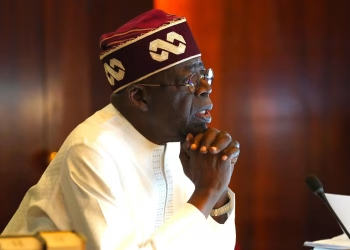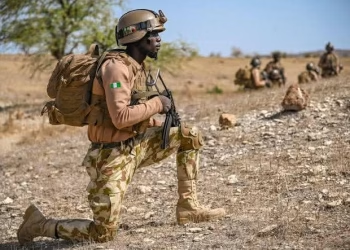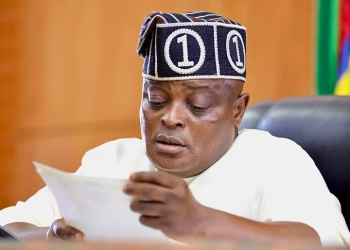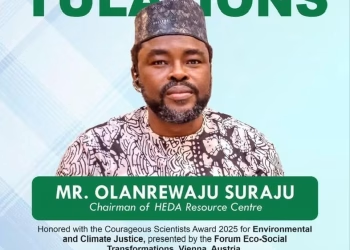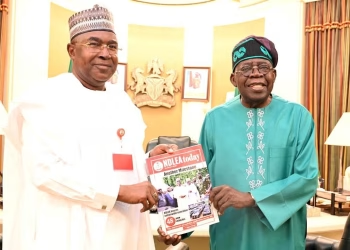President Bola Ahmed Tinubu and political leaders have been urged to appreciate that Nigeria faces increasing social and economic strain that raises the prospect of a major upheaval unless urgent steps are taken the stem the tide.
In a statement on Friday, the Nigerian Working Group on Peace Building and Conflict Prevention said the country needs to urgently address the prospect of a slip into widespread violence across the country.
It said economic and social crises are pushing citizens to the edge with foreseeable consequences on sustainable development.
‘While the Government tries to deal with the ENDSARs protests, it should also realise that the protests may reoccur again unless authorities meet their obligations to the people.’
The statement was signed by the regional coordinators of the group, National Coordinator, Adewale Adeoye; Taiwo Adeleye (South-West); Werinipre Digifa (South-South), Abuka Onalo Omobaba (Middle-Belt), Kudu Abubakar (North West); and Fred Onijika (South East) and Lawan Idris (North East). The group was established in 2017, following a peace building and conflict resolution conferences held in the six geo-political political zones in Nigeria.
The Working Group said it has embarked on tours of the six geo-political zones to engage social and cultural formations, using its existing structures to stem the prospect of ethnic and religious violence which could spark due to the current tension across Nigeria.
The group said though Nigeria returned to democracy in 1999, corruption, mismanagement and favouritism which ensures cronies are appointed into critical positions without consideration for expertise and integrity, but driven by opportunism, combine to undermine the ability of the country to emerge from perpetual underdevelopment and threats of violence.
‘Nigeria faces three major problems at the moment: the National Question which makes the definition of national interest absent; spineless corruption in Low and High places and the complete break-down of trust in public and private life of the citizenry’ the group said. The three underlined challenges are responsible for insecurity, violent ethnic clashes and armed rebellion in some parts of the country.
According to the Working Group, Nigeria faces the crisis of ethnic identity in the context of the primitive scramble for resources, the distribution and ownership of national ad indigenous wealth. In this vortex lay the intra-ethnic struggle for control by the majority ethnic groups and the cries and agony of ethnic minorities who feel trampled by the political, economic and social structure that exclude them.
‘Why individual ethnic minorities are given appointments, it does not automatically resolve the contradictions occasioned by the historic injustice they have experienced for decades which mere creation of states by fiat has not been able to resolve.’ The Working Group said Nigeria needs to address the fears and aspirations of ethnic nationalities in Nigeria through a new, people driven constitution where ethnic minorities are also real stakeholders and not mere end users of finished products, of laws, made without their genuine representatives.
The group said tackling corruption involves removing institutional obstacles that sustain graft like the bogus salaries of politically exposed persons, extravagance of the owners of private banks and financial institutions that perform public functions with public funds which they mismanage, their flamboyant lifestyles and their stiffneck resistance against modesty.
‘Corruption does not only fuel underdevelopment, it is also responsible for poverty, human misery, extremism and terrorism. Nigeria cannot fight corruption where the law itself creates structures that promote corruption one example being the millions of funds allocated to law makers for constituency allowance apart from their bogus salaries.’ The group said the situation is made worse by the fact that the process of emerging as elected leaders in Nigeria is marred by corruption and ineptitude which makes it difficult for credible leaders to emerge. ‘We are indeed at a crossroad of dreadful consequences unless the leaders do the right thing.’
With inflation at 34.2, essentials of life beyond the reach of the common man, food lacking on the table amidst threat to food security in rural and urban communities, the threat to democracy is not in doubt.
The Working Group urged Tinubu, state Governors and political leaders to understand and appreciate that Nigerians have been more than patient having endured for many years the betrayal of their elected leaders.
The group said the breakdown of trust is informed by many factors, the leaders saying one thing and doing the other, their lack of integrity, disdain for law and order, corruption and their penchant for putting their personal interests above collective interest.
‘Where there is trust, the citizens will obey laws and comply with Government policies without coercion, they will also be guided by reasonable expectations in personal and private conducts. Where trust is broken down, disorder, disrespect for laws and armed rebellion are the natural consequences.’
The Working Group called for the genuine and transparent dialogue with genuine intention to address the fears and expectations of Nigerians of all shades, including ethnic,religions, social and economic strata.
It urged Governments at all levels to stop the distribution of palliatives which in itself leads to scarcity of food items after government mass bulk purchases which also lead to inflation apart from the lack of social security numbers to ensure the palliatives do not go to the same people all the time.
‘The funds being used for palliatives should be invested in agriculture. If the government had done this agro-investment eight months ago, by now the results would been food glut across the country. Palliatives only address the cosmetic needs of a few people without creating the pillars of jobs and real economic growth which the country urgently needs.’



